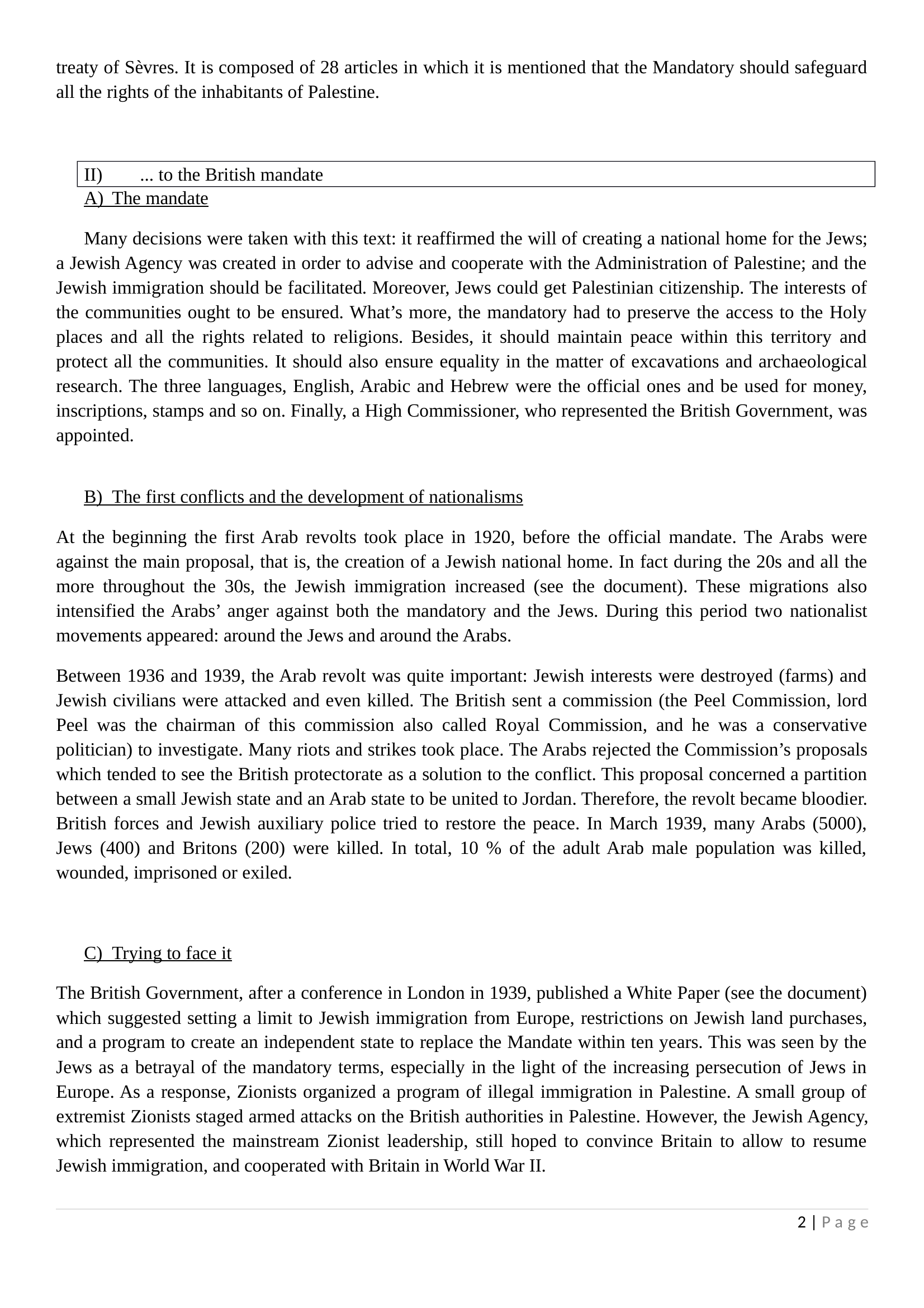Middle East
Publié le 04/10/2015
Extrait du document
«
treaty of Sèvres.
It is composed of 28 articles in which it is mentioned that the Mandatory should safeguard
all the rights of the inhabitants of Palestine.
II) ...
to the British mandate
A) The mandate
Many decisions were taken with this text: it reaffirmed the will of creating a national home for the Jews;
a Jewish Agency was created in order to advise and cooperate with the Administration of Palestine; and the
Jewish immigration should be facilitated.
Moreover, Jews could get Palestinian citizenship.
The interests of
the communities ought to be ensured.
What’s more, the mandatory had to preserve the access to the Holy
places and all the rights related to religions.
Besides, it should maintain peace within this territory and
protect all the communities.
It should also ensure equality in the matter of excavations and archaeological
research.
The three languages, English, Arabic and Hebrew were the official ones and be used for money,
inscriptions, stamps and so on.
Finally, a High Commissioner, who represented the British Government, was
appointed.
B) The first conflicts and the development of nationalisms
At the beginning the first Arab revolts took place in 1920, before the official mandate.
The Arabs were
against the main proposal, that is, the creation of a Jewish national home.
In fact during the 20s and all the
more throughout the 30s, the Jewish immigration increased (see the document).
These migrations also
intensified the Arabs’ anger against both the mandatory and the Jews.
During this period two nationalist
movements appeared: around the Jews and around the Arabs.
Between 1936 and 1939, the Arab revolt was quite important: Jewish interests were destroyed (farms) and
Jewish civilians were attacked and even killed.
The British sent a commission (the Peel Commission, lord
Peel was the chairman of this commission also called Royal Commission, and he was a conservative
politician) to investigate.
Many riots and strikes took place.
The Arabs rejected the Commission’s proposals
which tended to see the British protectorate as a solution to the conflict.
This proposal concerned a partition
between a small Jewish state and an Arab state to be united to Jordan.
Therefore, the revolt became bloodier.
British forces and Jewish auxiliary police tried to restore the peace.
In March 1939, many Arabs (5000),
Jews (400) and Britons (200) were killed.
In total, 10 % of the adult Arab male population was killed,
wounded, imprisoned or exiled.
C) Trying to face it
The British Government, after a conference in London in 1939, published a White Paper (see the document)
which suggested setting a limit to Jewish immigration from Europe, restrictions on Jewish land purchases,
and a program to create an independent state to replace the Mandate within ten years.
This was seen by the
Jews as a betrayal of the mandatory terms, especially in the light of the increasing persecution of Jews in
Europe.
As a response, Zionists organized a program of illegal immigration in Palestine.
A small group of
extremist Zionists staged armed attacks on the British authorities in Palestine.
However, the Jewish Agency,
which represented the mainstream Zionist leadership, still hoped to convince Britain to allow to resume
Jewish immigration, and cooperated with Britain in World War II.
2 | P a g e.
»
↓↓↓ APERÇU DU DOCUMENT ↓↓↓
Liens utiles
- Middle East - Geography.
- Religions of Middle East - geography.
- Languages of Middle East and the Caucasus - geography.
- Middle East: Political - geography.
- Middle East: Earth at Night - geography.


